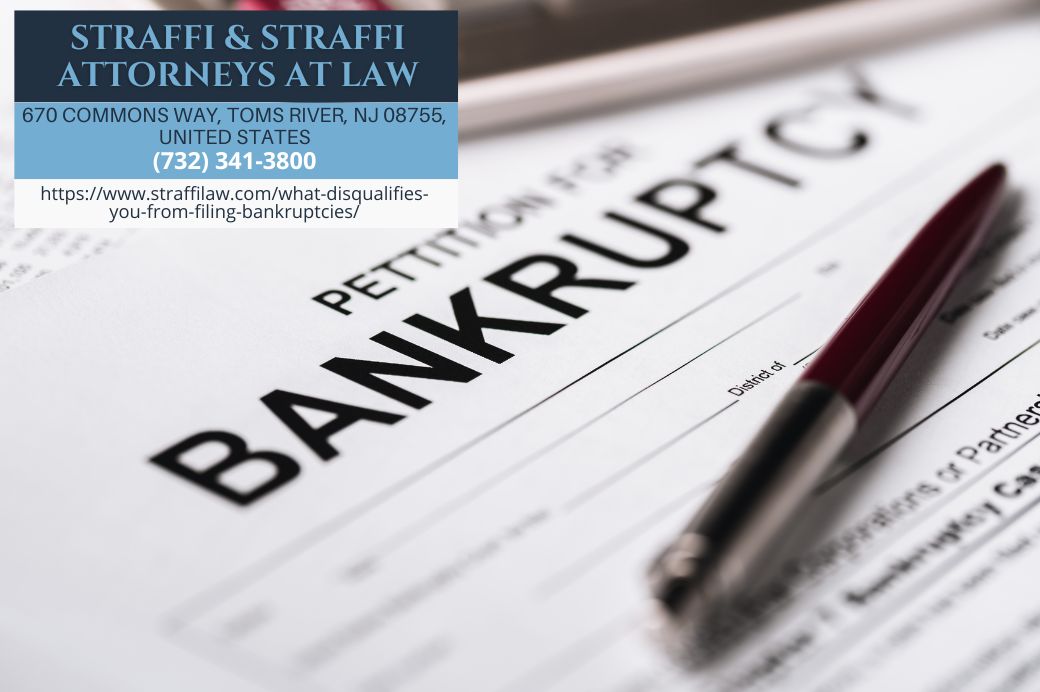New Jersey bankruptcy lawyer Daniel Straffi (https://www.straffilaw.com/what-disqualifies-you-from-filing-bankruptcies/), of Straffi & Straffi Attorneys at Law, provides critical insights into the factors that can disqualify individuals from filing for bankruptcy. In the complex legal landscape of bankruptcy, knowing these disqualifications can help individuals prepare adequately and avoid unnecessary pitfalls when seeking financial relief.
Daniel Straffi, a seasoned New Jersey bankruptcy lawyer, emphasizes the importance of understanding the eligibility criteria before starting the bankruptcy process. According to Straffi, filing for bankruptcy can provide a fresh start for individuals drowning in debt, but not everyone qualifies for this relief. It’s vital to know the potential disqualifications to avoid case dismissal or legal complications. These factors include recent dismissals of previous bankruptcy cases, fraudulent actions, and restrictions related to previous bankruptcy discharges.
One of the most common disqualifying factors is a recent dismissal of a previous bankruptcy case. According to New Jersey bankruptcy lawyer Daniel Straffi, if the previous bankruptcy case was dismissed, there is typically a 180-day waiting period before a person can file again. This rule is designed to prevent individuals from abusing the bankruptcy system. A dismissal may occur if the debtor fails to comply with court orders or rules, or if they voluntarily dismiss their case after a creditor requests relief from an automatic stay. Straffi explains that understanding this waiting period is crucial for anyone who has had a bankruptcy case dismissed recently.
Another key factor that may disqualify individuals from filing for bankruptcy is fraud. Daniel Straffi points out that fraudulent actions, such as hiding assets, misrepresenting debts, or selling property for less than its actual value before filing, can lead to disqualification. Fraudulent activity can result in the dismissal of one’s case and even legal penalties. Straffi advises that bankruptcy trustees or creditors typically initiate fraud investigations, and if any fraudulent behavior is detected, it can severely jeopardize the chances of obtaining debt relief through bankruptcy.
Beyond these immediate disqualifications, Daniel Straffi highlights time restrictions related to previous bankruptcy discharges as another critical factor. “For instance, you cannot receive a Chapter 7 discharge if you have been discharged from a Chapter 7 bankruptcy within the last eight years,” says Straffi. “Similarly, if you have received a discharge from Chapter 13 within the previous six years, you may not be eligible for a Chapter 7 discharge.” These restrictions are put in place to prevent repeat filings and ensure that bankruptcy is a last resort for financial relief.
Daniel Straffi also underscores the importance of understanding which debts cannot be discharged in bankruptcy. While bankruptcy can provide relief from most debts, certain obligations such as alimony, child support, and tax debts are generally not dischargeable. These debts are classified as "Domestic Support Obligations" (DSOs) and remain enforceable even after bankruptcy. Straffi advises that while filing for Chapter 13 bankruptcy may offer a structured repayment plan for these debts, bankruptcy itself will not eliminate the obligations.
Student loan debt, although challenging to discharge, is another area that Daniel Straffi addresses in the discussion of bankruptcy disqualifications. The New Jersey bankruptcy lawyer notes that while most student loans are not dischargeable, under rare circumstances, proving "undue hardship" may allow for their discharge. However, Straffi cautions that this is a high legal standard to meet, and in most cases, student loans remain intact after bankruptcy. Despite this, Straffi explains that bankruptcy can still help by relieving other types of debts, making it easier to manage student loan repayments.
To avoid the mistakes that could lead to disqualification, Daniel Straffi stresses the importance of complying with all legal requirements when preparing a bankruptcy case. Mistakes such as failing to complete mandatory credit counseling or failing to disclose all assets and income can result in case dismissal. Additionally, preferential transfers—such as paying off certain creditors shortly before filing—can complicate the case, leading to further delays or denial of a discharge.
For anyone considering filing for bankruptcy in New Jersey, working with a knowledgeable bankruptcy lawyer such as Daniel Straffi is essential. Filing for bankruptcy is a significant decision that can have lasting consequences on one’s financial future. By understanding the disqualifying factors, individuals can avoid common pitfalls and ensure a smoother path to debt relief. With personalized guidance from Straffi & Straffi Attorneys at Law, individuals can better understand their eligibility for bankruptcy and take the necessary steps to achieve a successful outcome.
About Straffi & Straffi Attorneys at Law:
Straffi & Straffi Attorneys at Law, located in New Jersey, is dedicated to helping individuals and businesses find financial relief through legal means. Led by New Jersey bankruptcy lawyer Daniel Straffi, the firm can provide personalized legal services to clients seeking debt relief, offering guidance through bankruptcy filings and alternative solutions to financial hardship.
Embeds:
Youtube Video: https://www.youtube.com/watch?v=KQ1gFK8Anh4
GMB: https://www.google.com/maps?cid=18340758732161592314
Email and website
Email: familyclient@straffilaw.com
Website: https://www.straffilaw.com/
Media Contact
Company Name: Straffi & Straffi Attorneys at Law
Contact Person: Daniel Straffi
Email: Send Email
Phone: (732) 341-3800
Address:670 Commons Way
City: Toms River
State: New Jersey 08755
Country: United States
Website: https://www.straffilaw.com/







